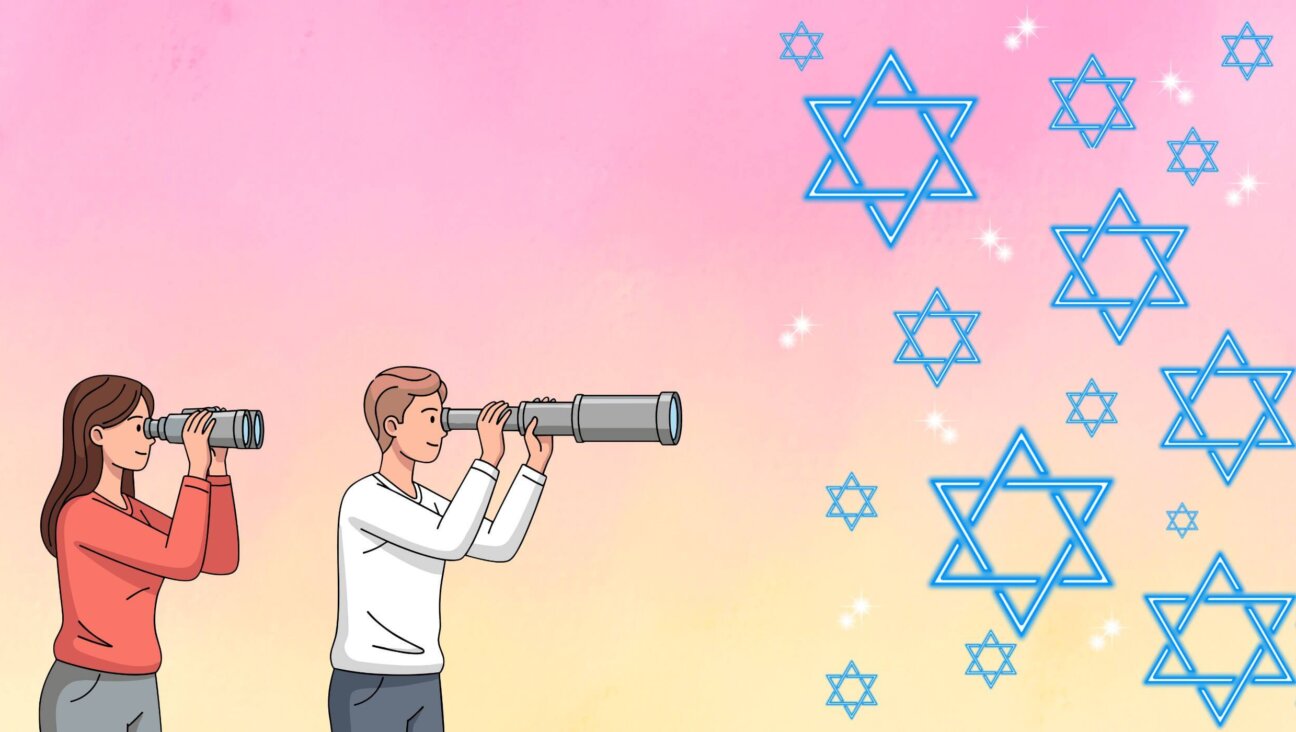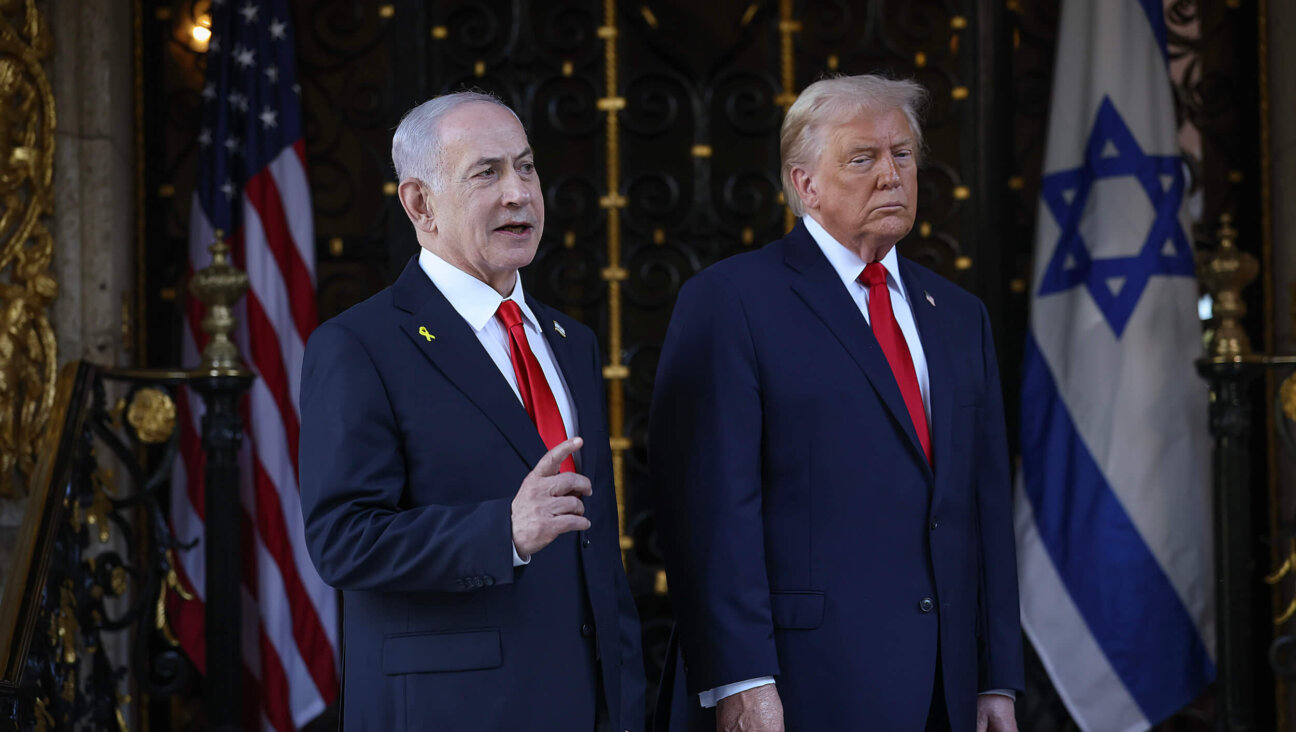Over the Top Protest Down Under
Over the last month there has been an acrimonious public confrontation between the leadership of the Australian Jewish community and those who were once that community’s natural allies and closest friends — the political left, and more particularly, the Australian Labor Party.
The issue was the decision by the Sydney Peace Foundation to award its annual Sydney Peace Prize to Hanan Ashrawi, the Palestinian academic and former Palestinian Authority Cabinet minister. The award was to be presented by Bob Carr, the Labor premier of the state of New South Wales and a long-standing friend of the Jewish community and of Israel.
The news of the award and of Carr’s role in it provoked a campaign of protest, organized by the Australia-Israel Jewish Affairs Committee, known as Aijac. Fifty thousand people — not all of them Jewish — signed a petition urging the award committee to reconsider, and urging Carr not to make the presentation.
To those far away from Sydney, the scrum may seem like little more than mundane local politics. The ripples felt among Australia’s Jews, however, are part of a tide of choices facing Jews around the world: Whether to engage with Palestinian leadership — and with whom to engage, whatever our feelings of outrage at their apologies for suicide bombers who target innocent Israeli civilians.
The campaign by Aijac was perfectly legitimate political lobbying — but whether it was well-advised lobbying is another matter. More controversial were alleged attempts to persuade corporate backers of the peace foundation awarding the prize to withdraw their funding and to pressure Carr to withdraw from the event.
Media reports of this pressure produced a predictable media furor about Jewish conspiracies and the power of the Zionist lobby. The usual critics of Israel and the alleged sinister influence of the Jewish community were given plenty of ammunition, which they cheerfully used. This had the unfortunate effect of making the tactics used by Aijac the dominant media theme of the week, not the question of whether Ashrawi was a worthy recipient of a peace prize.
Ashrawi is a complex personality, and she has said and written many contradictory things about the recognition of Israel, the use of terrorism and related issues over the past decade. It is clear that she tailors her rhetoric according to her audience.
In my view, however, what Ashrawi has said in the past — or even what she thinks now — is not the issue. The issue is what she will say and do in the future, as a leading Palestinian who might well be part of a future Palestinian government. Sooner or later, an Israeli government will make a peace deal with a Palestinian leadership — though not with the Arafat regime or the killers of Hamas and similar groups.
Even in the current circumstances, it is in Israel’s interests to maintain lines of communication with those who will be part of that leadership, whatever they may have said in the past. This was the view that Menachem Begin and Anwar Sadat took of each other, and rightly so. This was also the view that Carr took of Ashrawi — after clearly drawing a red line between right and wrong.
“Violence only ever serves to retard the Palestinian cause,” he said at the award ceremony of the Sydney Peace Prize. “Israel will never consent to the creation of a Palestinian state under the duress of terror. You cannot bomb your way to statehood. You cannot bomb your way to peace. So there must be an end to bloodshed and terror.”
It was an important thing that Ashrawi heard this unalloyed truth, and heard them from a man who had just shown, by his very presence at the award ceremony, that he was not afraid of criticism from the Jewish community. It was also important that in media interviews while she was in Sydney Ashrawi explicitly said that she supports a two-state solution to the Middle East conflict, thereby admitting that the Palestinians must recognize Israel in practice as well as in theory.
Australia’s 120,000 Jews are only 0.5% of the population, and they are now heavily outnumbered by Muslims — since the Lebanese civil war a quarter-century ago, 300,000 Lebanese Muslims have settled in Australia, overwhelmingly in Sydney. This growing Muslim presence in Australia is the subtext many see beneath the Ashrawi affair. In fact, over the past decade, there has been a shift in public opinion against Israel in Australia, as there has been in every Western country except the United States. Not even the horrific scenes resulting from suicide bombings in Israel have been enough to reverse this trend of opinion.
One doesn’t want to overstate this: The death of 89 Australians at the hands of Islamist terrorists in Bali last year has had a sobering effect on public opinion, and the political elite in the ruling Liberal Party — led by President Bush’s “mate,” Prime Minister John Howard — and the Labor opposition are more pro-Israel than their European counterparts. After all, the week of the Ashrawi visit saw Labor propose and the government agree to legislate the banning of Hamas as a terrorist organization.
Nevertheless, when Aijac tried to mobilize Australian opinion against awarding the Sydney Peace Prize to Ashrawi, and tried to persuade Carr to withdraw from the ceremony, they stirred up opposition not just from the usual anti-Israel chorus, but from people usually supportive of Israel.
There are few politicians anywhere more sympathetic to Israel and to the Jewish community than Carr, the chair for 20 years of the Labor Friends of Israel. Yet he firmly rejected Jewish appeals to stay away from the ceremony. Instead, at the event he heaped praise on Ashrawi: “I salute tonight one hopeful voice. A voice that calls for peace and justice, and more than the laying down of arms for a new way of thinking, a new era of equity and freedom.”
Australia is a long way from the Middle East, but Australians should make any small contribution they can to achieving peace. If publicly recognizing the potential that Ashrawi embodies provides an opportunity to make a forthright statement in support of Israel’s right to exist, demanding an end to Palestinian terrorism as a precondition for a peace settlement and calling for a two-state solution — and getting Ashrawi to agree to those statements — then I am in favor of it.
Michael Danby is the Labor opposition whip of the Australian Parliament.















